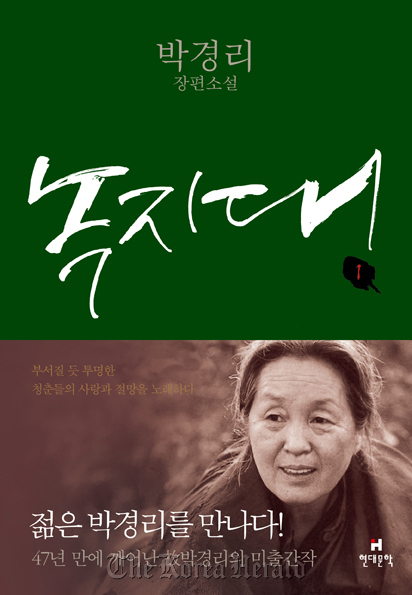‘Green Zone’ by Park Kyung-ni explores ‘Korean Beat Generation’ in the ’60s
Late prominent writer Park Kyung-ni is largely remembered for her famous historical sagas, including her 16-volume novel “Toji (The Land)” and “The Daughters of Pharmacist Kim.”
She created her masterpieces mostly by exploring the turbulent history of Korea during the 20th century, from the Japanese colonial period to the Korean War.
Yet readers will discover the late author’s relatively unknown flair for contemporary fiction writing, in this posthumously released novel about young Seoulites in love in the 1960s.
About four years after her death, Korea’s literary scene welcomes the publication of Park’s long obscure work, penned 47 years ago. For Park’s loyal readers, who are used to her poignant portrayal of one of the most turbulent periods of Korean history, the newly published book will come as a pleasant surprise.
The novel, titled “Nokjidae (Green Zone),” was initially published in Busan-based daily Busan Ilbo as a serial novel from 1964 to 1965.
Late prominent writer Park Kyung-ni is largely remembered for her famous historical sagas, including her 16-volume novel “Toji (The Land)” and “The Daughters of Pharmacist Kim.”
She created her masterpieces mostly by exploring the turbulent history of Korea during the 20th century, from the Japanese colonial period to the Korean War.
Yet readers will discover the late author’s relatively unknown flair for contemporary fiction writing, in this posthumously released novel about young Seoulites in love in the 1960s.
About four years after her death, Korea’s literary scene welcomes the publication of Park’s long obscure work, penned 47 years ago. For Park’s loyal readers, who are used to her poignant portrayal of one of the most turbulent periods of Korean history, the newly published book will come as a pleasant surprise.
The novel, titled “Nokjidae (Green Zone),” was initially published in Busan-based daily Busan Ilbo as a serial novel from 1964 to 1965.

Old copies of the newspaper were discovered by professor Bang Min-ho of Seoul National University at the school’s library in 2008. He had to photocopy every single issue of one-year’s worth of newspapers to publish the novel as a book, since there was no other form of the text available.
According to the book’s publisher, Hyundae Munhak Co. Ltd, the novel at the time was largely considered a simple, conventional love story without much substance, and therefore had never been published as a book.
Yet the piece is a meaningful portrayal of lost young Seoulites living in the post-war era, who refer themselves as “Korea’s Beat Generation.”
Its protagonist, In-ae, lost her parents during the war and lives off her uncle’s family. The brave and rebellious woman had run away from home a number of times since her high school years, once to a remote island and on another occasion to a Buddhist temple in the countryside.
The flaky university drop-out spends a lot of time in “Nokjidae,” a music salon in Seoul’s Myeong-dong. Her love story with a mysterious man named Kim Jeong-hyeon, whom she first met as a teenager during her run-away trip to the island, is interestingly interwoven with the ones of other colorful, layered characters.
While In-ae’s cousin Sook-bae, a well-off yet vulnerable university student, falls for married artist Sang-geon, Eun-ja, whose mother used to be a prostitute on a U.S. military base in Korea, can’t help but feel insecure in her relationship with wealthy man Gwang-su.

“The novel may seem like a conventional work that follows the typical style of the serial novels written for newspapers (back in the 1960s),” Bang said. “What Park wanted to talk about through this novel isn’t as simple ... She tried to depict the psyche and vision of the young generation of the 60s, who went through the war and its trauma, through the different love stories of the characters.”
Professor Kim Eun-kyung of KAIST, whose main research interest has been Park’s literary works, participated along with professor Bang in the novel’s publication, and said “Nokjidae” is significant as it deals with the young generation in Korea’s post-war era, unlike most of her other works.
“Most of her other works depict the lives of the older generation before and after the war,” she said. “Yet this one deals with dreams and hopes of the youngsters in the particular era.”
Park, who is also known for being mother-in-law of renowned poet Kim Ji-ha, died of lung cancer in 2008.
By Claire Lee (dyc@heraldcorp.com)
-
Articles by Korea Herald
More from Headlines
-
![NewsletterSubscribe
Start your day with a roundup of key stories from The Korea Herald with news and comment on all that’s happening in Korea.
[Robert J. Fouser] After the National Assembly election
1 out 3 Koreans live alone, family types becoming div](//res.heraldm.com/phpwas/restmb_idxmake.php?idx=652&simg=/content/image/2024/04/27/20240427050050_0.jpg&u=20240427115500) NewsletterSubscribe Start your day with a roundup of key stories from The Korea Herald with news and comment on all that’s happening in Korea. [Robert J. Fouser] After the National Assembly election 1 out 3 Koreans live alone, family types becoming div
NewsletterSubscribe Start your day with a roundup of key stories from The Korea Herald with news and comment on all that’s happening in Korea. [Robert J. Fouser] After the National Assembly election 1 out 3 Koreans live alone, family types becoming div -
 Meeting of president, opposition chief set to finally happen
Meeting of president, opposition chief set to finally happen -
 South Korea to launch space security center under spy agency
South Korea to launch space security center under spy agency















![NewsletterSubscribe
Start your day with a roundup of key stories from The Korea Herald with news and comment on all that’s happening in Korea.
[Robert J. Fouser] After the National Assembly election
1 out 3 Koreans live alone, family types becoming div](http://res.heraldm.com/phpwas/restmb_idxmake.php?idx=652&simg=/content/image/2024/04/27/20240427050050_0.jpg&u=20240427115500)




